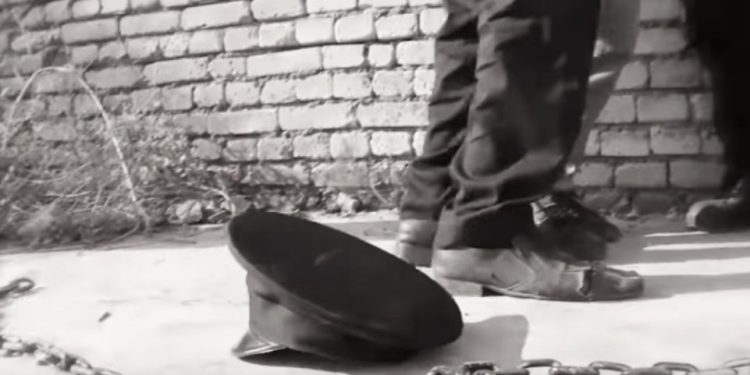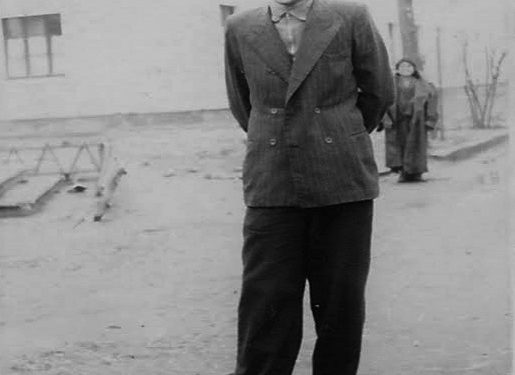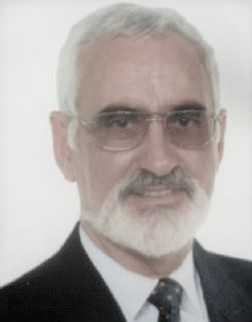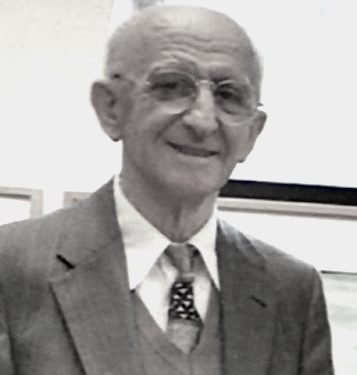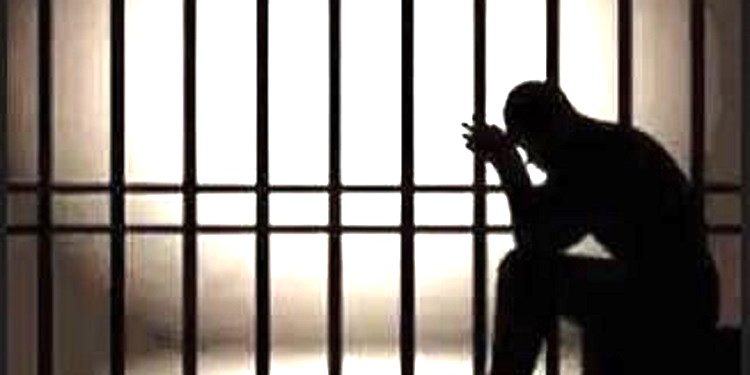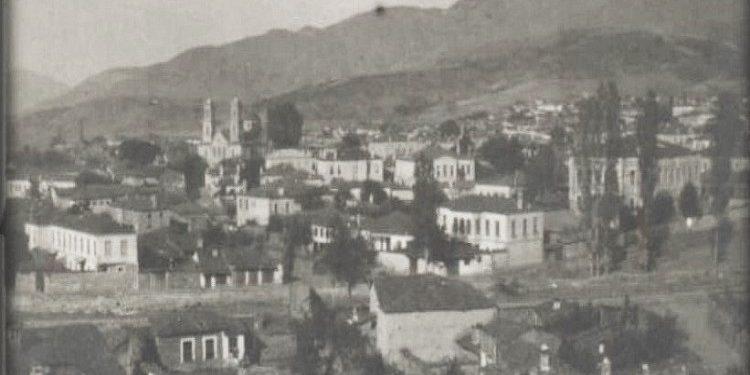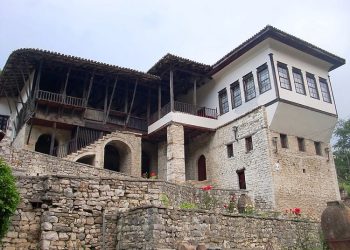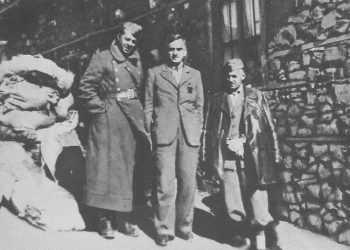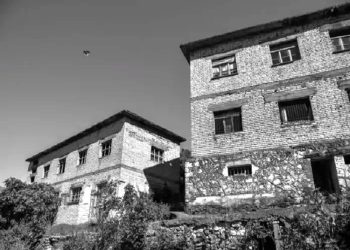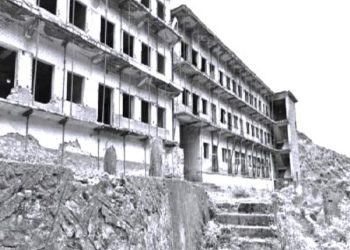By Thanas L. Gjika
The third part
Memorie.al / The history of our people, since the old times, are filled with acts of bravery of idealistic people, who did not spare their lives, for the benefit of society and the homeland. Thanks to them, our people have gained freedom from foreign yokes and moved towards progress. There were such people even during the years of the communist dictatorship. They dared to express their opinions in a different way, even to oppose the party-state line, but that regime arrested them, sentenced them with its trials, without a defense lawyer and declared them; “enemies of the people” and tortured them in prisons and labor camps. When they managed to get out of prisons, or return alive to their homes, state propaganda covered them with such epithets, so that the people abandoned and hated them, until they died out and were forgotten as worthless beings. Today’s time demands that such people should not be forgotten, but should be studied and appreciated, because their lives and deeds have regenerative values for the nation. We too, like any nation, need such torches of freedom and democracy. One such person was Thanas Ilo Qeleshi who, in his early youth, was conquered by communist ideas and joined the Communist Party, but when he saw some unjust actions of its politics, he dared to show his disapproval and to create a party cell, opposed to PPSh. To the life and achievements of this idealist, we dedicate this short essay, based on some documents and memories, that his son, Mihallaq Th. Cell, which I met here in the US.
Continues from the previous issue
Further, Mihallaqi tells:
“Inside the room, there were no chairs, the two policemen sat frozen to the side, we were in the middle. I looked at my father and he was looking at me. Although he was gray and emaciated, I recognized him, but he gave no sign that he recognized me.
I said: Father, I am Mihallaqi, your son, he concentrated. He cut me:
I do not know you. I got closer to him and said: Dad, I’m Malakja (that’s how he used to caress me when I was little), he focused, and we looked into his eyes. He approached me and said: Provocateurs also come to the prison here, which are treated like sons and daughters. Yes, now I know you…!
We hugged, hugged tightly and cried for a few seconds or minutes. Father broke away first, whispering in my ear: We must not cry, our tears, these scabs are happy.
– This is Agroni, Katerina’s husband, I introduced my brother-in-law. Next time, I will come with my daughter-in-law, next time, with Katerina, they also want to meet you. I have two daughters; Katerina has a daughter and a son. We will come to you regularly, don’t worry.
He took my right hand and rubbed it. When his fingers stuck to the calluses, I said:
– Then I was expelled from school and I couldn’t even become a nurse, I always worked with a pickaxe, thank goodness I’m strong.
Then I got to the heart of the conversation:
– They told me that you convicts, who have served more than half of the sentence, can be released and we want you to come home. Mom has seizures, from time to time, she falls into depression, but when she has you in front of her eyes, I believe she will get stronger and recover.
-Listen, son, – my father answered me – approaching me and lowering his voice, – they will release you, but you must hand over a letter to write, that you ask for forgiveness and mercy from the state party, for the sins and crimes you have committed, etc. As for me, I have not committed any sin or crime; I have no need to apologize. I am a convict of conscience and I do not want to lose my courage now after so many years of suffering. You came to fill my mind, to ask for forgiveness and mercy, go away and don’t appear again.
In order not to irritate him further, I apologized for saying those words. I told him that; the desire to have him in the bosom of the family; he made me talk like that, don’t take me for granted.
– For today, said my father, the minutes of the meeting are over and if you agree with me, as a prisoner of conscience, let’s meet, yes to fill my mind, so that I can be released as soon as possible, like those who made themselves rags, don’t come again
-Good, good, I said, hugging him again. Then we parted, promising to come again.
The next time, I went with Efi, my daughter-in-law. Then with my sister, Katerina. Efi has the ability to express respect quickly and wholeheartedly. The conversation stuck to both of them, right from the beginning. We continued the meetings in the prison of Gjirokastra, until November 1990, when the father fell ill and underwent surgery and was transferred to the prison hospital in Tirana…!
The release from prison, the dissatisfaction of Thanas Qeleshi after the dictatorship!
In the years 1989-1990, Ramiz Alia with a close group of collaborators, prepared the plan on how to implement the path of “Albanian Katowice”, for the transition from the dictatorial system to the Free Market Economy system, from the one-party political system to the pluralist system . According to this plan, the main goal was that the power and wealth of the country would be inherited by PPSh loyalists, with their security associates.
For this reason, since 1990, lists of convicted families were selected. Those who had someone who had escaped abroad were offered the opportunity to go to these relatives. Thus, the police bodies provided many ex-convicts with visas and got rid of them from Albania. Those who did not have fugitives were asked to sign that request, for mercy and forgiveness, where the promise was also written that they would always be loyal to the party.
The security worked in secret and managed, after a year or two, to bring to the heads of the opposition parties and the Associations of the Persecuted, the ex-convicts who had signed, before being released from prison, that request for mercy and forgiveness, that is, the letter that forced them to continue serving the communist dome, which was already in the shadows.
Thanas Qeleshin, Sigurimi put him in a group of prisoners of conscience and kept him longer in prison. In this group, of 88 people, there were also Spartak K. Ngjela, Fatos T. Lubonja, Thanas I. Qeleshi, the Shkodrans who were convicted for overturning the bust of Stalin, Eng. Petraq Xhaçka with friends convicted as an oil saboteur group, etc.
In order for these people not to be part of the opposition parties and not to be included in the lists of candidates for deputies, in the elections that were planned to be held on March 31, 1991, this group was released on March 13, 1991. This group of 88 people was released only after the Italian Prime Minister threatened that food aid would not be sent to Albania without the release of the members of this group, even though Ramiz Alia had shamelessly presented it as; “convicted for crimes against the state”.
Unfortunately, there from November-December 1990, Thanas Qeleshi, from bad food, or some continuous poisoning, had gangrene of the intestines and after the operation that was performed in the hospital of Gjirokastra, he was sent for care to the hospital of prison in Tirana. Thanasi could not bear the modification of excrement in a plastic bag, on the side of the abdomen. He insisted that the doctors in Tirana operate on him again and correct his excrement, with the normal route from below.
Because of this operation, he was not released from prison, according to the release decision, on March 13, 1991, but on March 17. He was transferred from the Prison Hospital to the Surgery Department of Hospital No. 2, where he stayed until April 15, 1991. In addition to the doctors in this hospital, his son, Mihallaqi, who lived with him, also served him in the hospital.
When he went to Korçë, his brother-in-law, Petraq Shallua, went to visit him. This one, instead of asking for forgiveness, for abandoning him and his manly attitude, told him:
– “Thanas, when the party forgave you and released you from prison, I also forgave you”.
Neither with the beginning of pluralism, nor later, many communists made no effort to evolve; they remained immoral, defending their and their party’s shameful deeds.
Thanasi started to become active and formed in his house with some other ex-persecuted, the Association of Political Persecuted for the District of Korça. Being the initiator of this association and the most persecuted and anti-communist, its members elected Thanas as its chairman.
The tortures of the time of the investigation, the life full of absences for more than 21 years in prisons and the last two operations, had extremely weakened this former colossus. Now, at the age of 62, he suffered from an atrioventricular block, with a low pulse, up to 30 beats per minute. Like all the downtrodden, Thanasi was filled with hope and romanticism after the elections of March 31, 1991.
Wanting to be able to serve the democratic processes, he wrote a letter to the Minister of Health, with which he asked him to help him perform heart surgery, to equip him with a device, to electrical intervention (basemaker), which was recommended by the doctors of Korça, as a means of salvation. But he didn’t get an answer!
His political convictions and experience helped Thanas, even though he was sick, to smell that democratic processes did not have the right vision, that they lacked light. He expressed this idea in a figurative way, in the literary sketch “Roads Seek Light”, which he began with the clarification:
“Not that I want to write about street lights…”, and then he called out:
“Oh my God! Why should we be like in prison? With snakes, mice, spiders…?! The light of the road, life needs it, people need it…” and ended with a critical subtext:
“Today in democracy, we need light more than ever. That light is life”
Thanasi accepted leaving him and other ex-convicts of conscience aside, thinking that the democratic government was busy with a lot of work and concerns. But he could not bear the re-appointment of Reshat Leskaj, and other former investigators from the time of the dictatorship, but in investigative duties, at the time when the Democratic Party was governing.
The Association of the Persecuted of Korça rose, at his instigation, in protest and these elements of the old Security were removed from the duties of the investigators. I.K., began to deal with historical studies, while Reshat, without conscience, became a private lawyer/lawyer, a job that turned him into a millionaire.
And then Thanasi grabbed the pen…
Without knowing the speech that Mikhail Gorbachev gave in Katowice, Poland and without knowing that the PPSh had planned the Albanian path, to follow the path of the Katowice decisions, Thanasi, with his own intuition, felt that Albanian democracy was being deformed.
He began to write the memories of his sufferings, in the prison and some condensed articles, with ideas and material from actual life, to show that; the files of the victims were alive and accused the undemocratic actions of the “Democratic” government.
“Oh God! What your ears don’t hear”! He began writing, – “The live files accuse”, – and continued to express his dissatisfaction with the disappointing reality:
“Persecutors are persecuted. Investigation gendarmes have become lawyers. We, former political convicts, suffer spiritually when we see that even today in democracy, many of those who convicted us are in leadership positions…?!
Below he mentioned the names of some young millionaires, who were driving around in cars, like the prosecutor; Arqile Kamburi who sentenced the “Radio Korça Occupation Group” to 72 years in prison, Judge Kiço Treska, who had signed so many crimes, Thanas Caca and Janaq Kapurani, who turned out to be false witnesses, to the “Qeleshi-Zguro-Fidani Group” . In the end, this sufferer closes the article with generosity:
“There are many of them. We do not seek revenge, we do not put everyone in one bag, but for the main figures of crimes, we seek the deserved punishment. That they pose a danger to democracy”.
This was a serious warning, formulated with his intuition in 1993, this former convict of conscience. This warning has accrual value even today, because the “Katovica Plan” did not and does not allow the punishment of the crimes of the communist system. But the non-punishment of those crimes is nothing but a new crime, which is being committed in post-communist Albania, because today’s political class is the offspring of the communist incubator…!
Personalities of the anti-communist resistance, such as Thanas Ilo Qeleshi, were not put in power, they were not given the necessary medical help, they were not given and have not been given the deserved titles “HONORARY CITIZEN OF KORÇA”, and the order “HONOR OF THE NATION” “, but they were left to die out, away from the attention of the society and the governments of the time.
Thanas Qeleshi tried to put some of his memories in a large notebook (account book). From these memories, the writer Sotir Andoni chose a fragment with the title; When they threw me handcuffs”, which he published in the newspaper “Korça Demokratike” in the column “These should not be forgotten”.
Weakness of health did not allow Thanas Qeleshi to write his full memoirs, which would be a valuable material for the vicissitudes he and his friends went through during the dictatorship…!
Thanas Ilo Qeleshi, passed away on December 7, 1994, at the age of 65. He left two children: Mihallaq, married to Efi (Eftimina) with two daughters and Katerina, married to Agron Malollari, with one son and one daughter. This family situation created the last pleasures for this suffering father.
However, the families of his two children found themselves in unsuitable conditions in Albania during the tragic events of 1997, so they sought political asylum in the USA as persecuted families. They obtained this status and took refuge in 1999, in the state of Massachusetts, where they continue their normal lives.
Their children are now married and have achieved notable successes, which can be written about another time.
American newspapers have written several times about the family of Mihallaq Qeleshi, about its past and about the successes here. And the press in Albania has not devoted a single page to the values of the immortal, Thanas Ilo Qeleshi, nor to his descendants…?! Memorie.al
Reference:
- This opinion of the veteran Viktor Stratobërdha has been reproduced by the writer Dionis Bubani, in his book of memoirs “Tragic joke of my life”, as a thought heard by Viktor when he was released from prison.
- The manuscript of this request is kept by the family of Mihallaq Qeleshi.
- Korça Demokratike Newspaper, year I, April 19, 1993, p. 2.
- Korça Demokratike Newspaper, year II No. 15 (31), 29 August 1993, p. 1.




